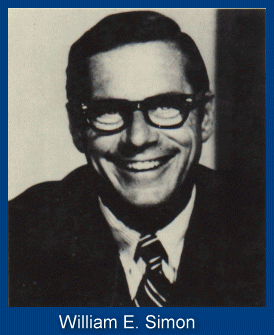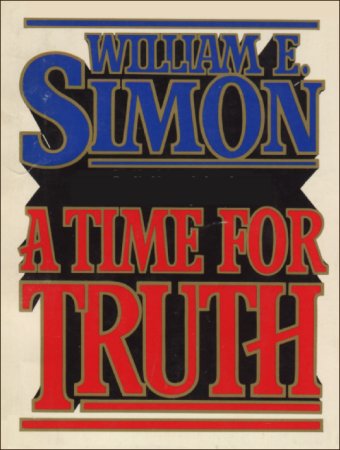| The extraordinary wealth of our nation is well known throughout the
world. The statistics which record the tangible results of that system nevertheless miss
the invisible dimension. The single most awe-inspiring thing about our economic system
lies in what is absent, what is not perceivable to the naked eye. it is the fact that the
flood of wealth emerges from the lack of government control, from the lack of
state-imposed or "national" purposes and goals. The capitalist miracle occurred
in the United States, the politically freest nation in the world, precisely because this
explosion of wealth is uniquely a result of individual liberty. That is what most people
do not understand--and that is what deserves to be shouted from the rooftops. Ironically,
this connection between political and economic freedom is perfectly understood by
totalitarians. The communist theoretician knows precisely how to destroy individual
freedom; he destroys economic freedom, and the job is done. More specifically, he
expropriates private property, the means of production, and he forbids profits. He places
the entire production-exchange-consumption chain under the direct -rule of the state,
which means, of course, that he places the physical life of each individual at the mercy
of the state. That is the essence of tyranny.
The totalitarian, of course, never announces that his intention is to enslave
people. Quite the contrary, he invariably proposes to "liberate" them. He
rationalizes his tyranny righteously in the name of the collective well-being of the
"proletariat," "race," or "fatherland" or in the name of
"public interest," "brotherhood," or "equality." But all
these are invariably just rationalizations; the goal of tyranny is tyranny. And inexorably
it destroys economic life. The ultimate result is inevitably grinding poverty, an
inability to produce.
The rulers of the Soviet Union are fully aware that they preside over a sick and
stagnant economy, and they are also aware that they cannot go on indefinitely starving
their own people and depriving them of the most modest amenities of life. At the same
time, they know exactly how America generates its technological innovation and wealth.
They know that only by decentralizing and individualizing the decision-making process and
allowing free, competitive markets to develop across the length and breadth of the Soviet
Union can they generate technology and wealth. But, as one observer has said, "To
cure the patient would kill the doctor." To introduce true incentives and economic
freedom into the Soviet Union would destroy the communist state.
These are the polar systems of political-economic organization: at one extreme, a
free, unplanned, individualist market in a free individualist society which creates a
powerful and inventive economic system and produces wealth; at the other,
totalitarian-collectivist planning which destroys both the political and the economic
freedom of the individual and produces collective poverty and starvation. Only when one
has a good grasp of these polar alternatives is it possible to understand what has been
going on -- and going wrong -- in Western countries, and in our own country in particular,
in the past few decades.
To understand it, one need merely ask one question: What would happen to a society
if someone tried to mix these contradictory polar systems in the life of a nation? What
would happen if one tried to mix the free and the totalitarian, the unplanned and the
planned, the individualist and the collectivist elements in economic life? For an answer,
we must examine the industrialized nations of the West. Their economic "mix" is
known by many names --'liberalism, "interventionism, mixed economy," the
"welfare state," "social democracy," "democratic socialism,"
even "socialism."
None of these terms has a precise definition, but societies with such economies
share certain characteristics: Their intellectual and political leaders share the illusion
that a comparative handful of individuals can substitute their judgment for the billions
and trillions of decisions that go on in a market. Generally, they believe it possible to
use central planning to "correct" free market processes without destroying the
market itself. They advocate planning to increase economic efficiency, to enforce
competition, to eliminate the business cycle, to manipulate the money supply and rates of
interest, to determine prices and profits, to redistribute property and income, to speed
up or slow down the growth of the economy, to prevent discrimination, to eliminate
pollution and several hundred other things. Whatever such gentlemen deem to be in need of
improvement is sufficient cause for them to turn to central planning as a solution. The
result of such political leadership is a system that was accurately described by Newsweek
magazine (October 18, 1976) in an article entitled "Is Socialism in Trouble?"
"By and large," the writer said, "social democracy seeks a middle ground
between communism and capitalism."
The advocates of economic intervention clearly believe that their aims are worthy.
But if one deflects one's attention from the meritorious motives and goals of such
planners and simply looks at the nature of the system they have created --"a middle
ground between communism and capitalism"-- one sees that this is a regressive trend. |
 April 1975, after
a grade meeting in Moscow, I boarded Air Force Two with the U.S. delegation. Still caught
up in our official roles, we continued to discuss the ramifications of East-West trade.
Then, abruptly, the roar of the motor broke into our conversation, and as the plane taxied
down the runway, we all fell silent. After a moment or two Air Force Two lifted off. We
heard the dull thump of the locking wheels. The ground fell away beneath us. We were no
longer on Soviet soil! And everyone burst into applause.
April 1975, after
a grade meeting in Moscow, I boarded Air Force Two with the U.S. delegation. Still caught
up in our official roles, we continued to discuss the ramifications of East-West trade.
Then, abruptly, the roar of the motor broke into our conversation, and as the plane taxied
down the runway, we all fell silent. After a moment or two Air Force Two lifted off. We
heard the dull thump of the locking wheels. The ground fell away beneath us. We were no
longer on Soviet soil! And everyone burst into applause. deep, unnamable difference between the
Soviet officials and myself. It was the difference between men who have never known
freedom and men who were born free. Freedom is strangely ephemeral. It is something like
breathing; one only becomes acutely aware of its importance when one is choking.
Similarly, it is only when one confronts political tyranny that one really grasps the
meaning and importance of freedom. What I actually realized in Air Force Two is that freedom
is difficult to understand because it isn't a presence but an absence--an absence of
governmental constraint.
deep, unnamable difference between the
Soviet officials and myself. It was the difference between men who have never known
freedom and men who were born free. Freedom is strangely ephemeral. It is something like
breathing; one only becomes acutely aware of its importance when one is choking.
Similarly, it is only when one confronts political tyranny that one really grasps the
meaning and importance of freedom. What I actually realized in Air Force Two is that freedom
is difficult to understand because it isn't a presence but an absence--an absence of
governmental constraint.